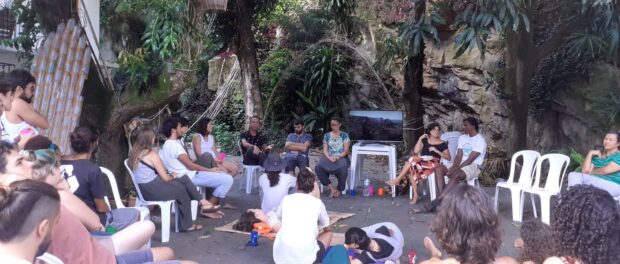
 This is the seventh article in a year-long partnership with the Behner Stiefel Center for Brazilian Studies at San Diego State University to produce a series of monthly favela-sourced human rights and environmental justice reporting from Rio de Janeiro on RioOnWatch.
This is the seventh article in a year-long partnership with the Behner Stiefel Center for Brazilian Studies at San Diego State University to produce a series of monthly favela-sourced human rights and environmental justice reporting from Rio de Janeiro on RioOnWatch.
On Saturday, January 25, activists from Rio de Janeiro’s peripheries united with local academics and concerned citizens for a roundtable discussion on environmental solutions. Titled “How Do We Postpone the End of the World with Environmental Education?” (based on the title of Brazilian indigenous leader Ailton Krenak’s 2018 book Ideias para Adiar o Fim do Mundo), the afternoon’s seminar was part of the annual Escola Mateira seminar, a three-day environmental education workshop organized by the Moleque Mateiro Institute.
Krenak’s work, which focused on the subjectivities of peripheral Brazilian groups that have maintained non-exploitative relationships with nature, provided fitting context for the event, which featured quilombo leader Adilson Almeida as well as Baixada Fluminense environmental and mobility activist Carlos “Greenbike” Oliveira. “We, environmental educators from the big city,” said Moleque Mateiro Project Director Pablo Araújo, “need to hear these stories to inspire our work so that we don’t end up working outside of this socio-environmental reality and its true issues.”
The event comes as pioneers from Rio de Janeiro favelas and peripheries have gained increased visibility for their role in environmental preservation. Local, community-based, micro-initiatives to create green spaces amid heat islands, beautify urban spaces, and implement alternative energy in the favelas have seen interest boom amid the global climate crisis.
In line with Krenak’s model of engaging with alternative, environmentally responsible perspectives, the afternoon’s conversation presented four distinct projects. One came from Almeida, president and founder of the Camorim Quilombo Association (ACUQCA), located in the West Zone of Rio, who emphasized the importance of collaboration. “You can start on your own, or without help,” said Almeida, “but you will never be able to finish alone.”
Almeida’s quilombo—a historic community descended from fugitive slaves—has engaged in group efforts in reforestation and organic gardening. When torrential rains destroyed their garden and brought impassable underbrush, the ACUQCA organized, together with the Sustainable Favela Network,* a collective action (known as a mutirão) to clear the growth, restoring the garden as well as their nearby archeological site. Almeida, who said the association serves to revive the history of the quilombo’s ancestors as well as create new spaces for resistance, also noted that ACUQCA works to pass on this legacy to younger community members. “We explain to the children what a quilombo is,” he said. “Most adults don’t even know!”
This note also rang true with poet and professor Jade Prata Bueno of Projeto Espasmo, who mediated the afternoon’s conversation. Bueno, who has worked to use poetry as “a form of conversation that will bring new values,” spoke of the work of ecology professor Fernando Fernandez and Palestinian poet, professor, and activist Rafeef Ziadah. Solutions begin with communication, Bueno said, and engaging children in that communication is critical. Reflecting on Ziadah’s work, Bueno concluded: “a country with children without perspective is a country without a future.”
For Carlos “Greenbike” Oliveira, bringing perspective to local youth goes hand-in-hand with environmental education. After earning a degree in environmental studies (making him the first in his family to attend college) in 2014 and returning home to his native Queimados, a city in Rio’s outer Baixada Fluminense known for particularly high incidences of violence, Oliveira found himself stuck. With months to go before his degree would be processed and no money for inter-municipal transit, he began biking into Rio’s city center. The daily four-hour trip turned into an activist endeavor, educating community members on the issue of urban mobility as well as the benefits of biking. Oliveira would go on to found Pedala Queimados, teaching local youth to build bikes out of bamboo, among other activities. The bike, says Oliveira, is “a tool for social transformation.”
For director Marcio Isensee e Sá, as well as scriptwriter and researcher Duda Menegassi, environmental education meant producing their own, web-based initiative. Their web series, Pé no Parque (Foot in the Park), produced as a collaboration between the NGO O Eco and the WikiParques online platform, provides brief documentary-style features, highlighting the beauties of Brazilian national parks. The series, with five seasons currently available on YouTube (each season dedicated to a specific park), takes viewers on a sort of virtual trip, with each episode pursuing a different theme on the given park, from tourism to park history to preservation.
The idea is to encourage responsible tourism to the parks while recognizing the importance of maintaining “untouched nature.” Menegassi hopes that park visitors will have their perspectives on environmental preservation transformed: “It is through visitation that people will begin to understand the real value of protecting nature,” she said.
Merging forests, quilombos, rural and urban peripheries alike, the day’s initiative served as a testament to Ailton Krenak’s work. Though, as Krenak wrote, “modernization threw these peoples from the fields and the forests into the favelas and peripheries, to become work hands in urban centers,” events such as these have begun to gather those same groups in solidarity, uniting them in the common cause of socio-environmental protection.
*The Sustainable Favela Network and RioOnWatch are both projects of Catalytic Communities.



